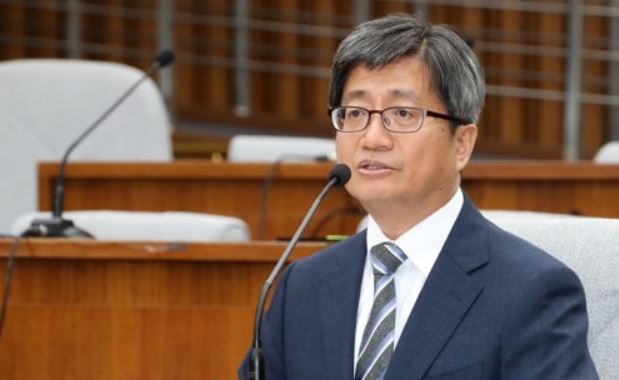South Korea’s parliament approved the appointment of Kim Meong-su as Supreme Court chief justice on Thursday, after more than a month of friction among lawmakers across the aisle.
Among the 298 lawmakers present in the currently 299-member parliament, 160 voted in approval of Kim, with another 134 voting against. One abstained and three ballots were listed as invalid.
 |
This photo, taken Sept. 12, 2017, shows Supreme Court Chief Justice nominee Kim Meong-su speaking during a parliamentary confirmation hearing at the National Assembly in Seoul. (Yonhap) |
Kim vowed to uphold the rule of law.
“I was able to finish the process with help from many. I once again feel the gravity of taking on an important role,” Kim said, thanking the parliamentarians for their support.
“I will make efforts to wisely overcome the challenges and difficulties the Supreme Court faces, and to embody the administration of justice for the people.”
Kim, currently chief of Chuncheong District Court, was tapped to lead the nation’s top court on Aug. 21 by President Moon Jae-in.
He will get a six-year term in office, succeeding Yang Seung-tae, who is to retire Sunday. According to the law, a Supreme Court chief justice holds the authority to appoint some 3,000 personnel positions in judiciary bodies, including three of the Constitutional Court’s nine justices.
Cheong Wa Dae welcomed the endorsement.
“It is a relief that we are able to avoid a leadership vacuum at the top court,” Yoon Young-chan, the chief presidential press secretary, told reporters.
“We express our gratitude to the legislature for approving the confirmation motion, and we will strive harder to better communicate (with the parliament),” he added.
The Assembly’s endorsement of Kim follows its Sept. 11 rejection of Constitutional Court President nominee Kim Yi-su, nominated by President Moon.
Stung by the unprecedented parliamentary veto, the ruling camp made all-out efforts to obtain Kim’s endorsement.
The floor leader of the ruling Democratic Party of Korea thanked opposition lawmakers and called the vote “a victory that opens the way to a cooperative parliament.”
“As a ruling party, we will lower ourselves, and openly accept the public’s opinions. We will join hands with opposition parties and work for reform in society and to better the lives of the public,” Rep. Woo Won-shik told reporters after the voting.
The main opposition Liberty Korea Party, which had strongly opposed the appointment of Kim, said it respects the results of the voting.
“I respect the decision of the parliament. But that does not mean that Kim’s unfit qualities can be forgiven,” the party’s Floor Leader Chung Woo-taik said.
“We hope for the new Supreme Court chief justice to maintain balanced and independent views after taking the role.”
Conservative lawmakers had attacked Kim for what they called his “left-leaning” political tendencies. They had pointed to how Kim led a group of liberal judges as well as a 2015 ruling in favor of a far-left teachers’ union.
“The chief nominee has clearly shown his biased political orientation, which is why we say he is unfit for the job,” Rep. Chung had said in the party meeting earlier in the day. He had also criticized Kim’s “biased view” on homosexuality, as Kim had hosted an academic seminar supportive on the subject. The conservative party largely disagrees with rights for sexual minorities.
Along with the main opposition, the splinter conservative Bareun Party had also adopted the notion to disapprove of the nominee as their party line.
The ruling Democratic Party, which holds 120 seats at the parliament, had strived to persuade and bring support from the 40-member centrist People’s Party, with Chairwoman Rep. Choo Mi-ae paying a surprise visit to party chief Ahn Cheol-soo’s office in the morning. As Ahn left for Cheongju, North Chungcheong Province, Rep. Choo shared words with the centrist party’s Floor Leader Rep. Kim Dong-cheol.
By Jo He-rim (
herim@heraldcorp.com)








![[Today’s K-pop] Blackpink’s Jennie, Lisa invited to Coachella as solo acts](http://res.heraldm.com/phpwas/restmb_idxmake.php?idx=644&simg=/content/image/2024/11/21/20241121050099_0.jpg)